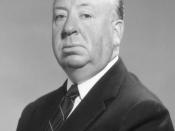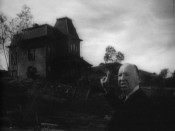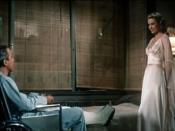From the creative mind of Alfred Hitchcock came many a classic film, but two that stand out are the thrillers Rear Window and Psycho. These films capture the viewer and create an atmosphere so unique and fresh that you feel as though you personally know the characters; sometimes you even feel like you're becoming the characters. Although the films have many similarities they both have completely different moods and themes. Most importantly the films can still hold up against today's incredibly high-budget Hollywood movies.
A main theme in Rear Window is voyeurism, exhibited by Jimmy Stewart's character Jeff Jeffries. The same theme is also present in Psycho with Anthony Perkin's character Norman Bates, but, unlike Rear Window, Psycho doesn't use it as the backbone of the plot. Reasons for the behavior differ in the films as well. Jeff Jeffries is confined in his apartment because of his broken leg so his voyeurism is a result of his boredom and fueled by his curiosity.
Norman Bates has more of an obsession and his behavior is attributed to his character and not his circumstances. James Griffith put it best in his Film Comment article Psycho: Not Guilty as Charged when he said of Psycho, "...the film disturbs us not because of what it allows us secretly to watch, but because it makes us confront the terror of being secretly watched"(Griffith 76).
According to Cyndy Hendershot in her Journal of Popular Film and Television article The Cold War Horror Film: Taboo and Transgression in The Bad Seed, The Fly, and Psycho, "Psycho represents Hitchcock's most explicit connection to the horror genre and his most blatant attempt to use transgression as both content in a film and as a marketing strategy"(Hendershot 20). Although we can regard Psycho as a film of the horror...


